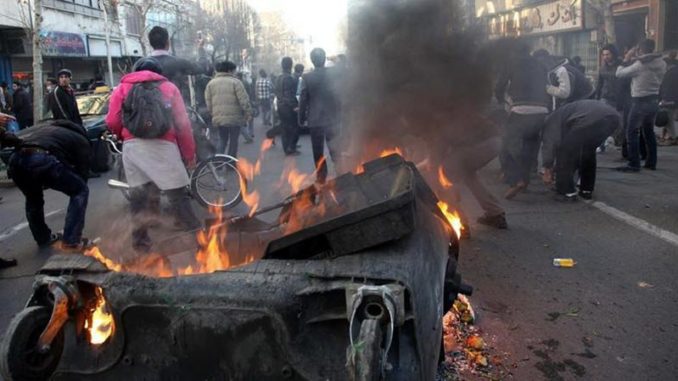
As Iran Regime prepares for massive U.S. sanctions on its oil industry effective November 5th, the regime is also facing a sharp rise in the number of protests sparked by the country’s economic crisis.
The oil sanctions targeting Iran Regime’s main source of income are the harshest action taken by the U.S. since Donald Trump pulled out of the 2015 nuclear deal in May.
At the time, after the signing of the 2015 nuclear deal between the Iranian regime and world powers, the regime was given economic incentives and access to frozen assets in exchange for the partial suspension of its nuclear activities and the reduction of its enriched uranium stockpile but Trump advised that the deal failed to ensure restrictions on Iran’s nuclear programme.
Back in August, the US reimposed sanctions on Iran’s use of the US dollar, car industry, and purchase of precious metals and aeroplane parts. The US hopes that these sanctions will bring the Regime back to the negotiating table for a new deal to addresses its malign behaviour, including support for terrorist groups and use of ballistic missiles.
Effect of Sanctions
The sanctions have already put intense pressure on the Iranian Regime, with the rial seeing a steep decline in value and the costs of everyday essentials skyrocketing. This has sparked increased protests and strikes which have only grown in size despite the Regime’s brutal crackdown.
When sanctions were first removed under the 2015 deal, Iran benefitted from being able to sell its oil freely across the world and signing billion-dollar agreements with Western firms like Airbus and Boeing. However, what didn’t change was the Regime’s economic mismanagement, which meant the country was thoroughly unprepared for Trump to withdraw from the nuclear deal.
Now, Trump has vowed that companies (or countries) who fail to comply with the sanctions will find themselves cut off from the US financial system; although some sanction waivers may be available to countries that significantly cut down on their oil imports.
Reaction of the Regime
Iranian President Hassan Rouhani tried to reassure the public that he would alleviate the economic problems, while also admitting that the situation may be bad for several months to come, but to the Iranian people his promises rang hollow.
Iran tried to circumvent the sanctions by selling its oil in an energy stock exchange on Sunday, with Iranian Oil Minister Bijan Zanganeh advising on Wednesday that 280,000 barrels of Iranian oil had already been sold on the IRENEX exchange and that 720,000 barrels would be sold soon.
However, even if Iran Regime would be able to sell 1 million barrels a day in the exchange, it is much less than the 2.5 million barrels a day the regime used to sell before re-imposition of sanctions was announced.
The European countries that remain with the nuclear deal have tried to shield their companies from US sanctions, but many European companies including General Electric, Maersk, Peugeot, Renault, Siemens, and Total have pulled out anyway.
Source: NCRI

